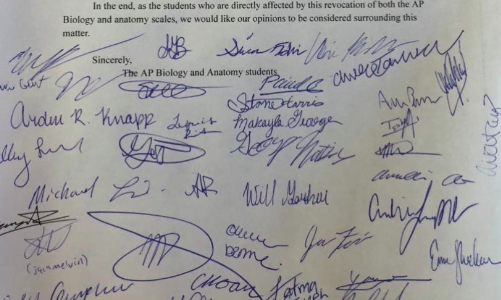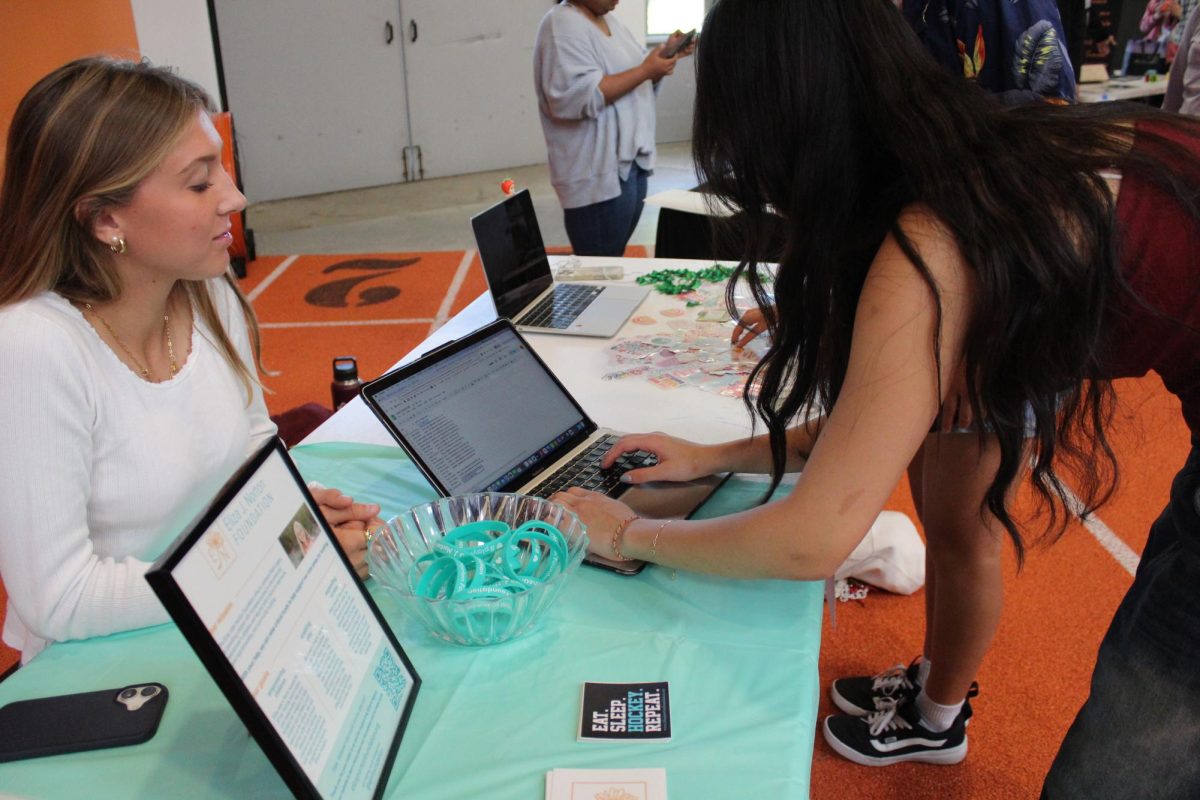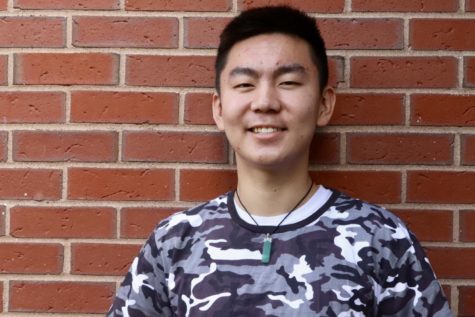AP Bio scale removal strikes division between students, teachers, admin.
Senior Stone Harris led charge to reinstitute scale

Credit: Kevin Wang
The scale that has been a part of AP Biology and Honors Anatomy and Physiology exams for years was taken away and raised concerns from numerous students currently enrolled in the course. “When I signed up for the class, I knew that the scale was something that I was going to get in order to keep a respectable grade in the class,” senior Stone Harris said.
February 10, 2020
The AP Biology and Honors Anatomy classes have traditionally had scales on their exams due to the difficulty of the courses, but recently they were eliminated due to rules regarding test-taking days. The move created an uproar from many students who then worked with administrators on creating new rules in order to get the scale back.
“The actual AP Bio exam that The College Board gives is scaled, and our AP Bio tests during the year are built up strictly of [College Board’s] AP Bio questions,” senior Stone Harris said. “If they are using the same questions as the actual exam, then it only makes sense that they be scaled as well in school.”
AP Bio tests are usually scaled in order for the students to do well in the class. Cyd Tyska, the AP Bio teacher, has a scale system in place so the students get a fair grade when taking the tests.
“I calculate the median from both sections, and if the median is below an 80, I add the number of points so that the median equals 80%,” Tyska said.
Depending on the difficulty of the test, the value of the scale varies. Students taking the class depend on the scale to raise their grades – sometimes, the scales even raise their grade a full letter grade.
“[The scale] depends on how well we do on the test,” senior Mallory Leonard said. “If we score highly to the actual median of the AP Bio exam, there is no scale, and [if we do poorly, we get a higher scale]. It impacts [our grades] a lot. Without the scale, it’s really hard to do well in the class.”
An important rule surrounding the scale is if you aren’t there on the testing day, you don’t receive it.
“One of the reasons why Ms. Tyska has instituted this policy is in order to provide the scale to the students who attend the test [on the day of the test] because a scale is determined by the students who take the test on the same day. There’s an actual sort of integrity behind the creation of the scale,” WHS Principal Allyson Mizoguchi said.
This year, the Wayland Public School system has instituted new start time changes, which made the high school start and end an hour later than prior years. The change impacts sports like alpine skiing – on certain days, the team has to get out of school earlier than 3:10 p.m., which is when the school normally ends, due to practices or meets. This results in them sometimes missing a testing day and, thereby, the scale.
“A scale only works when it’s applied to students who take the test at the same time because [that’s] how it’s calculated and created,” Mizoguchi said.
Students on the alpine ski team and some parents felt that missing the testing day and not receiving the scale was unfair because it was out of students’ hands that they were missing the test.
“There were complaints filed by multiple parents, people who said that the scale was not fair because sometimes you have to miss it either because you’re sick or have sports,” Leonard said.
These complaints lead to the scale being eliminated for all students which created a controversy among students.
“My role in all of this was really learning about it, and then two things happened: one, learning more about concerns that have been raised [by] talking with Ms. Tyska, determining that it’s hard for us to defend a practice if students don’t experience an equitable testing situation,” Mizoguchi said. “The only [solution] for them was to remove the scale entirely.”
This sudden change in the course brought numerous complaints and disappointment for some students.
“I felt I was getting the unfair side of things just because it’s inconvenient for a few people, [and] it doesn’t mean you can take [the scale] away halfway through the year,” Harris said. “When I signed up for the class, I knew that the scale was something that I was going to get in order to keep a respectable grade in the class. [More than] 95% of the class complained about getting the scale removed.”
Feeling that the decision was inequitable, Harris wrote a petition for returning the scale with assistance from senior Sam Baron and some other classmates who were also affected by the change.
“I recognized that everyone else thought that the scale was necessary for the class, and everyone else thought that it was wrong that it’s getting taken away,” Harris said. “So, I figured that a petition would help in getting it back. I just went around the school, and whenever I saw someone who was getting affected by the scale being removed, I asked if they’d like to sign [the petition].”
Soon after, Harris handed in the petition with 50 student signatures to the administration.
“I was not surprised [to see the petition],” Mizoguchi said. “WHS is a place where students, when they feel strongly about particular issues, generally [find] a person to talk to about those concerns. It was a very appropriate communication and very reasonable, very measured.”
Mizoguchi felt impressed by the actions taken by the students in response to the new change made into the course.
“It’s a powerful thing when a large group of students feels strongly about an issue and bring it to their building leader,” Mizoguchi said. “That’s a time when we listen. I appreciated the opportunity to learn about their concerns and perspective on the matter.”
After receiving the petition, Mizoguchi decided to meet the students who spearheaded the petition and do more thinking and reviewing about this issue.
“Where we’re at now is that I reversed that decision because I ended up feeling and realizing that to change the grading practice halfway through a course is not the appropriate thing to do,” Mizoguchi said. “But, we do have a process ahead of us where we have to think carefully about this practice, which is carefully constructed.”
With the scale currently back again, Harris and other students feel relieved that he can receive what was an important part of the class for him.
“[The scale] is super necessary,” Harris said. “It does affect my grade a lot because it’s a 10-point scale every test, so that’s like a full letter grade [changed]. And, you know, that is a huge difference. It’s great that they’re going to revisit the scale.”
At the same time, Mizoguchi thinks that the final decision regarding the issue should be made carefully.
“I think we need to be patient with the process,” Mizoguchi said. “Now is the time to review, but not the time [to] necessarily change things because we don’t want to impact students currently enrolled in those courses.”
Although there are still several steps left in reviewing the practice, Mizoguchi has hopeful thoughts about the future.
“Whatever we decide, it would be clearly communicated to students in future years for those courses,” Mizoguchi said. “The best outcome is when folks feel that they understand the outcome and they don’t feel penalized by the outcome and that is clearly communicated in advance, so that will be our goal.”



























